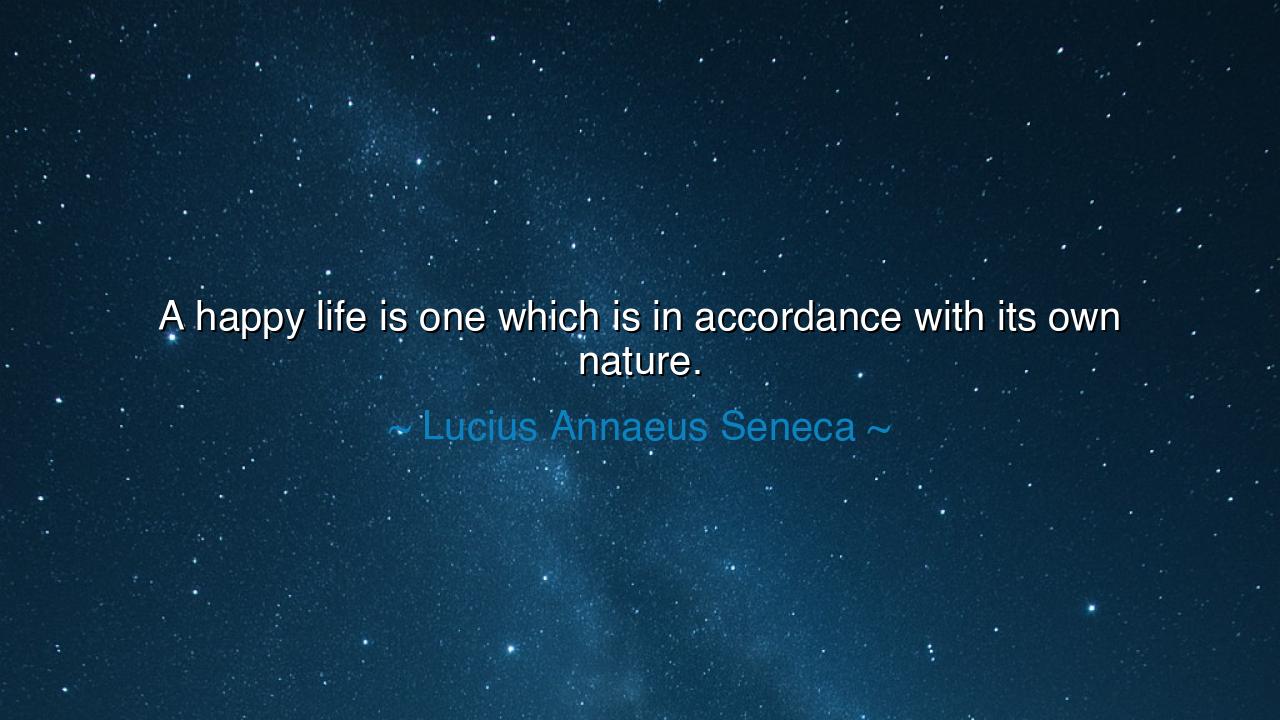
A happy life is one which is in accordance with its own nature.






Hear the timeless voice of Seneca, the Stoic sage of Rome, who declared: “A happy life is one which is in accordance with its own nature.” These words, though simple, carry the weight of centuries, for they reveal the essence of human fulfillment. The path to true contentment is not found in riches, nor in power, nor in the applause of others, but in harmony with one’s own being. To live contrary to our nature is to live in conflict with ourselves; to live in accordance with it is to dwell in peace, no matter the storms outside.
The Stoics believed that the universe is woven together by nature, governed by reason and order. Each creature, from the smallest insect to the mightiest emperor, has its own role, its own essence. A tree is happy when it grows tall in the soil where it was planted; a river is content when it flows toward the sea. So too with man: a happy life is not about forcing ourselves into unnatural shapes, but about discovering and embracing the truth of what we are. To fight against one’s own nature is to wage war against the self.
Consider the story of Marcus Aurelius, Rome’s philosopher-emperor and pupil of Seneca’s Stoic tradition. Surrounded by endless battles, political intrigue, and betrayal, Marcus might have sought escape in pleasure or despair. Yet he found steadiness by living in harmony with his nature—a nature that sought wisdom, justice, and virtue above all. In his Meditations, he wrote not of luxury, but of self-discipline, kindness, and the shortness of life. Though burdened with the weight of empire, he was free within himself, for he lived according to his own essence, not the clamor of the world.
In contrast, think of Nero, who was once the pupil of Seneca himself. Nero’s nature was corrupted by desire for excess, cruelty, and vanity. Though he possessed immense wealth and unrivaled power, he was haunted by paranoia and misery. He betrayed his friends, murdered his kin, and burned his own city. His life was the very image of disharmony with nature—a lesson that fortune without alignment of soul brings ruin, not happiness. Thus Seneca’s words become a warning as well as a promise: happiness cannot be bought or seized, it must be lived in truth.
What then does it mean for us, children of a later age? It means that we must turn inward and ask: What is my nature? What values call me? What work brings me alive? Happiness comes not from imitating others, but from walking one’s own path. To compare ourselves to another is like a bird envying the lion, or the river envying the mountain. Each of us has a place in the vast harmony of the cosmos, and only by embracing it can we be whole.
The lesson is heroic yet tender: do not abandon yourself in pursuit of false treasures. Seek instead the alignment of your daily life with your innermost truth. When your thoughts, words, and actions are in harmony with your nature, you will know the peace that neither poverty nor misfortune can take away. To betray your nature, however, is to carry endless conflict in your heart, no matter how gilded your cage may be.
Therefore, take practical steps: spend time in silence, so that you may hear your own soul. Ask yourself not “What do others expect of me?” but “What does my nature call me to become?” Live with honesty, cultivate virtue, and measure your worth not by the world’s standards, but by the fidelity with which you honor your essence. In your work, relationships, and struggles, choose always what aligns with your true being.
Remember always: a happy life is not the absence of hardship, but the presence of harmony. To live in accordance with your nature is to live as the universe intended—steadfast, peaceful, and free. This is the teaching of Seneca: do not seek happiness outside yourself, for it is already within, waiting to be awakened by truth.






AAdministratorAdministrator
Welcome, honored guests. Please leave a comment, we will respond soon